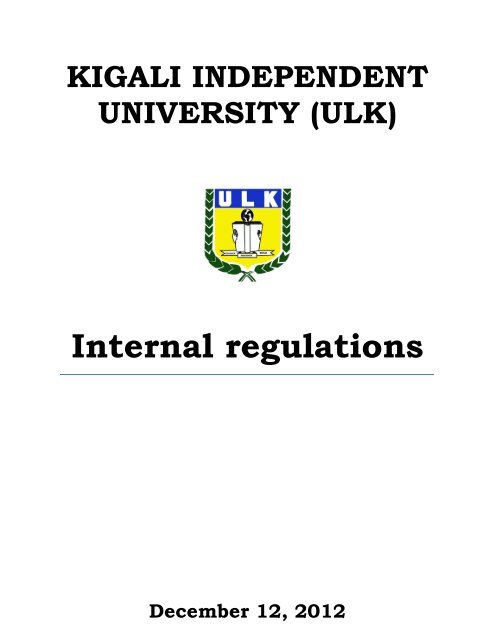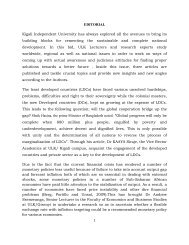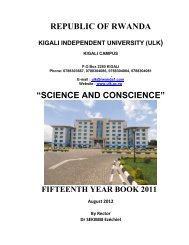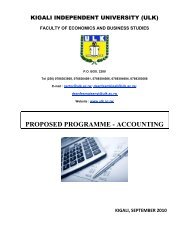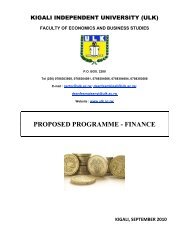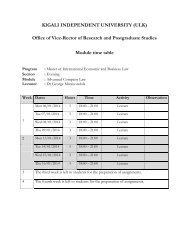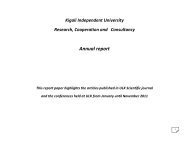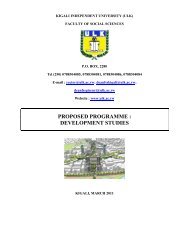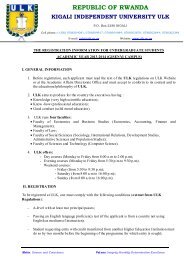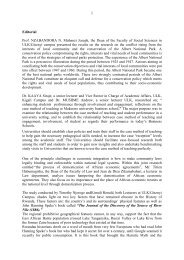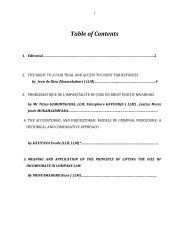Internal regulations - Kigali Independent University ULK
Internal regulations - Kigali Independent University ULK
Internal regulations - Kigali Independent University ULK
Create successful ePaper yourself
Turn your PDF publications into a flip-book with our unique Google optimized e-Paper software.
KIGALI INDEPENDENT<br />
UNIVERSITY (<strong>ULK</strong>)<br />
<strong>Internal</strong> <strong>regulations</strong><br />
December 12, 2012
ii<br />
Table of Contents<br />
CHAPTER I. CREATION, PHILOSOPHY, VALUES, MOTTO, MISSION AND<br />
OBJECTIVES .................................................................................................. 1<br />
CHAPTER II. <strong>ULK</strong> ORGANS ............................................................................. 2<br />
II.1. <strong>ULK</strong> Founder and President’s Office ............................................................. 2<br />
II.1.1. The Founder and President .................................................................... 2<br />
II.1.2. The Director of the <strong>ULK</strong> Founder and President’s Office ......................... 3<br />
II.1.3. The Auditing Committee ........................................................................ 3<br />
II.2. Board of Directors ........................................................................................ 3<br />
II.3. The Academic Senate ................................................................................... 5<br />
II.4. The Executive Council .................................................................................. 7<br />
II.5. The Faculty Council ..................................................................................... 7<br />
II.6. The Department Council .............................................................................. 8<br />
CHAPTER III. THE STAFF ............................................................................... 8<br />
III.1. The teaching staff ........................................................................................ 9<br />
III.2. Administrative, technical and support personnel ...................................... 11<br />
CHAPTER IV: GENERAL ACADEMIC REGULATION ........................................ 11<br />
IV.1. Students ................................................................................................... 11<br />
IV.2. Courses..................................................................................................... 13<br />
IV.3. Evaluations ............................................................................................... 17<br />
IV.4. Diplomas and Degrees .............................................................................. 21<br />
CHAPTER V: DISCIPLINE AND SANCTIONS ................................................... 21<br />
CHAPTER VI: FINAL PROVISIONS ................................................................. 23
REGULATIONS 2012<br />
CHAPTER I. CREATION, PHILOSOPHY, VALUES, MOTTO, MISSION AND<br />
OBJECTIVES<br />
Article 1: The <strong>Kigali</strong> <strong>Independent</strong> <strong>University</strong> (<strong>ULK</strong>) is a private institution of higher<br />
learning founded on 15 th March, 1996. This <strong>University</strong> was accredited by the<br />
convention No 001/98 of 20/02/1998 with the Government of the Republic of<br />
Rwanda. <strong>ULK</strong> got its legal personality by the Ministerial order No 13/17 of<br />
07/06/2002. <strong>ULK</strong> is governed by laws and <strong>regulations</strong> concerning Higher<br />
Education in Rwanda, the Law regulating Labour in Rwanda, the <strong>ULK</strong> <strong>Internal</strong><br />
Regulations and Manual of procedures.<br />
Article 2: <strong>ULK</strong> is governed by laws and <strong>regulations</strong> concerning Higher Education in<br />
Rwanda, the Law regulating Labour in Rwanda, the <strong>ULK</strong> <strong>Internal</strong> Regulations, the<br />
Manual of Procedures and the Manual of Attributions.<br />
Articles 3: The philosophy of <strong>ULK</strong> is based on four fundamental principles:<br />
- To have faith in God;<br />
- To have positive thoughts;<br />
- To live on ethical values.<br />
- To know your mission on earth<br />
Article 4:<br />
Excellence”<br />
The values of <strong>ULK</strong> are “Integrity, Humility, Determination and<br />
Article 5: The motto of <strong>ULK</strong> is “Science and Conscience”.<br />
Article 6: <strong>ULK</strong>’s mission is: to educate, to teach, to conduct research and to serve<br />
the community.<br />
Articles 7: Objectives of <strong>ULK</strong><br />
<strong>ULK</strong> aims at the following objectives:<br />
- Providing a solid scientific, intellectual and professional training to the<br />
students;<br />
- Promoting research in order to meet the community needs;<br />
- Rending services to the community;
2<br />
- Creating a competent human resources potential and endowed with moral,<br />
civic and political solid values;<br />
- Organizing conferences and seminars to reinforce its teachings and<br />
researches;<br />
- Conferring academic titles in conformity with legal provisions related to the<br />
graduation act;<br />
- Awarding certificates at the end of short terms trainings;<br />
- Conferring merit titles and excellence awards.<br />
CHAPTER II. <strong>ULK</strong> ORGANS<br />
Article 8: The <strong>ULK</strong> organs are:<br />
- The Founder and President’s Office;<br />
- The Board of Directors;<br />
- The Academic Senate;<br />
- The Executive Council;<br />
- The Faculty Council;<br />
- The Department Council.<br />
II.1. <strong>ULK</strong> Founder and President’s Office<br />
Article 9: The <strong>ULK</strong> Founder and President’s Office comprises:<br />
- The Founder and President of <strong>ULK</strong>;<br />
- The Director of the <strong>ULK</strong> Founder and President’s Office;<br />
- The Auditing Committee.<br />
II.1.1. The Founder and President<br />
Article 10: The main attributions of the Founder and President are:<br />
- To represent legally the <strong>ULK</strong> association;<br />
- To appoint and dismiss some members of the Board of Directors;<br />
- To appoint and dismiss academic and administration executives of the<br />
university except those who are elected (Deans of faculties and Heads of the<br />
departments);<br />
- To ratify activities programmes and the <strong>ULK</strong> budget;
3<br />
- To decide about the university investment and extension;<br />
- To decide about the Masters and Doctorate studies;<br />
- To manage RWIGAMBA BALINDA’s foundation;<br />
- To confer academic titles, award merits and excellence titles;<br />
- Etc.<br />
II.1.2. The Director of the <strong>ULK</strong> Founder and President’s Office<br />
Article 11: The Director of the Founder and President Office is in charge of the day<br />
to day coordination of activities of the <strong>ULK</strong> Founder and President’s Office.<br />
II.1.3. The Auditing Committee<br />
Article 12: The Auditing Committee is in charge of controlling academic matters,<br />
bank accounts, finances and the quality of services provided by the <strong>ULK</strong><br />
Association establishments. It is made up of the Auditing Director and his staff.<br />
This committee is connected to the <strong>ULK</strong> Founder and President.<br />
For the sake of smooth running on behalf of these establishments, observations<br />
found by the auditors as well as their recommendations are regularly transmitted<br />
to the chairpersons of the entities or services concerned with the information and<br />
the decision taking as soon as possible.<br />
II.2. Board of Directors<br />
Cfr Articles 43-55 of the Law No 20/2005 of 20/10/2005 governing the<br />
organization and functioning of Higher Education<br />
Articles 13: The Board of Directors is the supreme administration organ of the<br />
university. It is composed by the following members:<br />
- The Chairman appointed by the Founder of <strong>ULK</strong>;<br />
- Three members representing the <strong>ULK</strong> Founder;<br />
- The Rector who is in charge of the minutes of the meeting;<br />
- The Vice-Rectors;<br />
- Three experts in education, science and technology appointed by the founder<br />
of <strong>ULK</strong>;
4<br />
- A representative of the administrative and technical staff elected by his<br />
colleagues;<br />
- A representative of lecturers who is elected by his/her peers;<br />
- Two students of both sex elected by their colleagues;<br />
- A private sector representative designated by the Rwandan Federation of the<br />
Private Sector on the request of the Institution Founder;<br />
- A representative of faculties deans elected by his/her peers.<br />
Article 14: Below are the main attributions of the <strong>ULK</strong> Board of Directors:<br />
- Provide points of view and suggestions as concerns higher education policies<br />
and strategies and assure the follow up of their execution in accordance with<br />
each higher education institution’s attributions;<br />
- To approve internal <strong>regulations</strong> of the institution;<br />
- To approve the budget;<br />
- To approve the annual activity plan of the institution and the budget related<br />
to it;<br />
- To adopt the conclusions and decisions submitted by the academic senate ,<br />
including particularly the academic awards, recruitment, promotions for<br />
lecturers and researchers of higher learning institutions as well as penalties<br />
imposed on them when necessary;<br />
- To approve the executive board decisions in matter of finance management,<br />
property and the <strong>ULK</strong> personnel;<br />
- To proceed with a follow up to each activity which allows <strong>ULK</strong> to fulfill his<br />
mission;<br />
- To approve <strong>ULK</strong> conventions signed by <strong>ULK</strong> with other higher learning<br />
institutions, research centers and other institutions in general;<br />
- Etc.<br />
Article 15: The Vice-President of the Board of Directors is elected by his/her<br />
colleagues during the first meeting chaired by the President of the Board.<br />
Article 16: The Vice-President replaces the President of the Board of Directors<br />
when the latter is absent.<br />
Article 17: The Board of Directors meets once in three months requested by its<br />
President or Vice-President in case of the president’s absence while 2/3 of its<br />
members are present.
5<br />
Article 18: In case of emergency and impossibility of the Board of Directors to sit,<br />
the Rector of the institution of higher learning can urgently decide in order that the<br />
institution of higher learning fulfils its mission.<br />
In this case, the Rector communicates these decisions in writing to the Board of<br />
Directors within 3 working days of the decision. The Board of Directors looks into<br />
and decides about theses decisions during its next meeting.<br />
Article 19: The Board of Directors decisions are reported to the Founder and<br />
President of <strong>ULK</strong> within 5 days.<br />
Article 20: The Board of Directors members are granted with attendance fees<br />
which amount is determined by the Founder and President of <strong>ULK</strong>.<br />
II.3. The Academic Senate<br />
Cfr Articles 56-78 of the Law No 20/2005 of 20/10/2005 governing the<br />
organization and functioning of Higher Education<br />
Article 21: The Academic Senate is an organ which examines questions related to<br />
the academic life of the university, namely teaching and research. It is composed by<br />
the following members:<br />
- The Rector of <strong>ULK</strong> who acts as the Chairperson;<br />
- The Vice-Rectors of <strong>ULK</strong> notably the academic Vice-Rectors who act as Vice-<br />
President and reporter;<br />
- The Deans of faculties;<br />
- The Directors;<br />
- The heads of departments;<br />
- One professor per faculty elected by his colleagues;<br />
- An entitled lecturer per faculty elected by his colleagues;<br />
- The commissioner to academic affairs of the General Association of <strong>ULK</strong><br />
students (AGE<strong>ULK</strong>);<br />
- A student by faculty who is elected by his/her peers.<br />
Article 22: Below are the Academic Senate’s tasks:<br />
- Setting up strategies, programs as well as academic and research schedules<br />
which are to be submitted for approval to the Board of Directors before<br />
implementation;
6<br />
- Preparing and availing the academic <strong>regulations</strong> for approval to the<br />
Administrative Board as regards admission requirements, teaching<br />
conditions, good conduct, sitting for examinations, degrees and certificates<br />
issued by the institution;<br />
- Appreciating any decision related to exams or other forms of assessment<br />
before submitting them for approval to the Board of Directors;<br />
- Conducting and supervising teaching-related activities, research and<br />
education within faculties, departments and other Centres of the Higher<br />
learning institution;<br />
- Suggesting and submitting to the Board of Directors any proposition on<br />
creating, reducing, changing, suppressing or merging faculties, departments<br />
and centers within the Higher Learning Institution;<br />
- Preparing and submitting suggestions related to employing, promotion to the<br />
Board of Directors, and if need be the contract termination and dismissal of<br />
lecturers and researchers;<br />
- Preparing and submitting to the Board of Directors any proposition about<br />
subdivision, merging and closing up of the higher learning institution;<br />
- Elaborating and submitting to the Board of Directors the annual report of<br />
academic, research and teaching activities undertaken within the institution<br />
- Performing and executing any activity required by the Board of Directors;<br />
- Etc.<br />
Article 23: Ordinary senate meetings are convened by the Chairperson once in two<br />
months. Extraordinary senate meetings are convened by the Chairperson when<br />
requested by one-third (1/3) of its members and whenever judged necessary. In the<br />
absence of the chairperson, his/her deputy can convene ordinary or extraordinary<br />
meetings.<br />
Article 24: The Senate’s decisions are taken through consensus. Contrarily, they<br />
are taken through the absolute majority by polling the members present in the<br />
meeting. In case of vote equality, the chairman’s decision is preponderant.<br />
Article 25: The Senate can require assistance from the faculty council or from a<br />
resource person in order to better perform its tasks.
7<br />
II.4. The Executive Council<br />
Cfr Articles 64-78 of the Law No 20/2005 of 20/10/2005 governing the<br />
organization and functioning of Higher Education<br />
Article 26: The executive council looks forward to administering and managing the<br />
university on a daily basis, and takes decisions for the smooth running of the<br />
university. It is made up of:<br />
- The <strong>ULK</strong>’s Rector;<br />
- The Vice-Rectors;<br />
- The Deans of Faculties;<br />
- The Directors;<br />
- The Heads of departments.<br />
Article 27: The Executive Council meets once every two weeks on invitation of its<br />
President, namely the Rector, of its Vice-President (the Academic Vice-Rector) or on<br />
the request of one-third (1/3) of its members.<br />
II.5. The Faculty Council<br />
Article 28: The Faculty Council analyses all the issues related to teaching and to<br />
research within the Faculty. It is made up of the following members:<br />
- The Dean of the faculty, who also acts as its President;<br />
- The heads of Departments;<br />
- The Faculty’s permanent teaching personnel;<br />
- One (1) student from each department of the faculty, this one being elected<br />
by his/her colleagues.<br />
Article 29: The Faculty Council meets once a month on invitation of the Dean of<br />
the Faculty, or else on the request of the most ranked or aged head of the<br />
department in case of the Dean’s unavailability, especially if both possess the same<br />
academic degree. Such a case occurs on the request of a third (1/3) of the faculty<br />
members.<br />
Article 30: Deans of faculties and heads of departments are elected by members of<br />
the teaching staff for a three year mandate, only once renewable in order to sustain<br />
academic, administrative and research activities under their supervision and<br />
attributions.
8<br />
II.6. The Department Council<br />
Article 31: The Department Council analyses all the issues related to teaching and<br />
research in the Department. Its members appear as follows:<br />
- The Head of Department;<br />
- The Permanent teaching staff of the Department.<br />
The Council of the Department meets at least once every two weeks on the request<br />
of the Head of the Department.<br />
CHAPTER III. THE STAFF<br />
Article 32: In order to be hired on a partial or full time basis at <strong>ULK</strong>, the following<br />
is required:<br />
- The existence of a vacant post;<br />
- Submitting an application form;<br />
- A Curriculum Vitae;<br />
- Notified copies of the degrees or certificates;<br />
- If possible an official act of appointment to the latest position;<br />
- 2 passport photographs;<br />
- to display scientific; intellectual, professional and moral aptitudes and<br />
abilities tailored to the post to be provided;<br />
- A photocopy of a national ID or a residence card for foreigners;<br />
- To pass successfully the required test.<br />
Article 33: Effective hiring is subject to positive six month probation. During that<br />
period, each party can terminate the contract in accordance with the law in force<br />
and the law regulating Labour in Rwanda.<br />
Article 34: Members of the teaching staff (part and full time) as well as those of the<br />
administrative, technical and support staff are requested:<br />
- to observe <strong>ULK</strong>’s <strong>regulations</strong>, procedures and other requirements;<br />
- to serve <strong>ULK</strong> with commitment and integrity;<br />
- to conform with the <strong>ULK</strong>’s philosophy and values;<br />
- to safeguard <strong>ULK</strong>’s interests in any circumstance;<br />
- to avoid any act or attitude likely to blackmail the dignity of their functions<br />
and that of the <strong>ULK</strong> on service as well as off service;
9<br />
- to partake into other university’s activities aimed at the population<br />
development.<br />
Article 35: In line with Law regulating Labour in Rwanda, working hours amount<br />
to 45 hours per week following the structure of the institution. Annual leaves<br />
coincide with school holidays. However, for the teaching staff, working hours are<br />
reduced to 40 hours per week split as follows: from 8:00 am to 2:00 pm and from<br />
5:30 pm to 9:30 pm for 4 days in a week.<br />
Article 36: The following categories constitute <strong>ULK</strong>’s staff.<br />
1. The teaching and research staff;<br />
2. The administrative and technical staff;<br />
3. The supporting staff.<br />
III.1. The teaching staff<br />
Article 37: Attributions of the teaching and research personnel:<br />
- Setting up courses and lecturing for 300 H per year in order to provide<br />
students with required knowledge;<br />
- To carry on research in order to promote science, technology and services to<br />
the community;<br />
- To ensure the follow-up and assistance to students in their studies and<br />
research work;<br />
- To participate in exams supervising, invigilation, in processing students’<br />
academic claims about their marks, and whatever administrative task<br />
required by the hierarchy;<br />
- To be committed to students’ education and to serve as a model in matter of<br />
good conduct.<br />
- To participate in other activities in relation to the mission of the Institution.<br />
Article 38: No lecturer can start teaching without:<br />
- Receiving the content of the course notes, module or unit given by the<br />
Department;<br />
- Handing in a copy of his/her course notes, module or unit to the<br />
Department in conformity with the above content;<br />
- Signing the contract with <strong>ULK</strong> authorities.
10<br />
He is also required to teach the contents of the course in its entirety and to abide<br />
by the calendar established by the Faculty.<br />
Article 39: Any teaching staff member is evaluated by students at the end of the<br />
course and by the hierarchy at the end of the academic year based on:<br />
- his/her scientific competence (his/her handling of the course contents,<br />
scientific articles and papers publishing);<br />
- his/her pedagogic competence (methodology, techniques and strategies<br />
applied in transmitting efficiently the course contents);<br />
- his/her moral aptitudes (punctuality, integrity, sense of responsibility,<br />
commitment to students’ education, etc);<br />
- his/her assiduity and commitment to accomplish academic and<br />
administrative tasks.<br />
In order to maintain or keep his/her course, a lecturer must get at least 65% of<br />
marks of the evaluation done by his/her students.<br />
Article 40: Part-time teaching personnel with at least the rank of Lecturer are<br />
recruited among the staff from other universities. Local human resources from<br />
other fields holding the required scientific competence, can be recruited as well.<br />
Article 41: In order to teach in another institution, a full time lecturer must be<br />
allowed to do so by the Academic Vice-Rector.<br />
Article 42: Academic requirements and ranks are the same as those applied by the<br />
world’s good universities, <strong>ULK</strong> recruits among holders of the following degrees:<br />
- Lecturer : 4 years of seniority as an assistant-lecturer after publishing three<br />
scientific research works, or a master’s degree<br />
- Senior lecturer: Doctor by thesis<br />
- Associate Professor: 4 years of seniority as a senior lecturer with 4 scientific<br />
publications.<br />
- Professor: 4 years of seniority as associate professor with 4 scientific<br />
publications.<br />
Article 43: Part-time teachers benefit from salaries or fees in conformity with their<br />
academic degree.
11<br />
Article 44: Part-time teaching personnel sign a work contract with <strong>ULK</strong>,<br />
represented by the Finance and Administrative Vice-Rector and the Academic-vice<br />
Rector.<br />
Article 45: The teaching and research staff members have the right to exert<br />
consultancy services on the basis of a dully signed consultancy contract of which<br />
fees are distributed at 70% for the teacher and all related expenses, and 30% for<br />
the university.<br />
III.2. Administrative, technical and support personnel<br />
Article 46: The Administrative Staff is the staff who assist the Executive Board in<br />
fulfilling the <strong>ULK</strong>’s mission.<br />
Article 47: The support staff is the staff employed by the <strong>ULK</strong>, other than the<br />
teaching, the administrative and the technical staff.<br />
Article 48: The rights and attributions of the <strong>ULK</strong> administrative, technical and<br />
support staff are regulated by the Law regulating Labour in Rwanda, the law<br />
governing the Organisation and functioning of Higher Education, the <strong>ULK</strong><br />
Regulations, the Manual of Procedures and the Manual of Attributions.<br />
Article 49: Salaries raising for full time personnel consists of an annual increase of<br />
which the rate is dependable of the end-year performance evaluation (5% of the<br />
basic salary for grade “Excellent”, 3% for grade “Very Good” and 1% for Grade<br />
“Fair” or “Good”.<br />
Article 50: Grades “More or Less Good” and “Mediocre” automatically entail the<br />
termination of the employee’s contract, no matter if he/she is full or part time.<br />
CHAPTER IV: GENERAL ACADEMIC REGULATION<br />
IV.1. Students<br />
Article 51: <strong>ULK</strong> is accessible to anybody who complies with the admission<br />
conditions to higher education in Rwanda. Its doors are open to regular as well as<br />
to part-time students.
12<br />
Article 52: To be registered at <strong>ULK</strong>, one has to be a bearer of a study certificate<br />
providing access to the Higher Educational fields of his choice.<br />
Article 53: In order to be registered for any degree course, the prospective student<br />
must hand in:<br />
1. A notified photocopy of the required certificate;<br />
2. A dully filled in registration form;<br />
3. Four passport photos;<br />
4. A copy of the identity card;<br />
5. An evidence of registration fees payment;<br />
Article 54: A regular student is the one:<br />
- who meets with the registration conditions;<br />
- who has cleared registration and academic fees;<br />
- who has registered for the whole range of the academic year course;<br />
- who sits for exams as an assessment tool of the courses programs.<br />
Article 55: A student card is issued to each registered student. It must be<br />
produced in order to have access to the university premises, lectures, practical<br />
works, examinations and the library. It must bear the photograph and the<br />
signature of the Academic Director and the seal of the university.<br />
Article 56: A part time student is the one who has taken registration for specific<br />
courses of his choice in a given academic unit and who sits for exams in order to<br />
obtain a certificate.<br />
Article 57: In lieu of a student card, the part time student is given a registration<br />
testimonial pointing out the different courses to be attended.<br />
Article 58: In case he wishes, a regular student can as well register as a part time<br />
student in another program.<br />
Article 59: In order to be accepted to the graduate cycle at <strong>ULK</strong>, the student must<br />
fulfill the two following conditions:<br />
- He/She must hold a baccalaureate degree issued by <strong>ULK</strong>, or an equivalent<br />
degree acknowledged as such for the domain applied for:<br />
- He/she must fulfill the profile and entrance criteria set up by <strong>ULK</strong>.
13<br />
Article 60: Before registration, each applicant must read the text of the <strong>ULK</strong><br />
<strong>regulations</strong> and must accept to conform to its contents and to the educational<br />
philosophy of <strong>ULK</strong> and its values.<br />
Article 61: Registration and academic fees are fixed by the Founder and President<br />
of the <strong>University</strong>. They are not refundable, except in case of redundant or double<br />
payment.<br />
Article 62: Checking on the authenticity of handed in documents does not stop<br />
with registration; it is an ongoing process. In case the student’s file contains a fake<br />
academic document, the student will be excluded for ever from the university.<br />
Article 63: Each class must have a class representative, a Deputy class<br />
representative and 3 advisers who are democratically elected by their peers.<br />
Elections are held under supervision of the Director of student affairs (or his/her<br />
delegate) and the delegates of the AGE<strong>ULK</strong> executive committee.<br />
Article 64: The main attribution of the promotion representative and his Deputy<br />
consists in representing the promotion to the <strong>ULK</strong>’s authorities and academic staff.<br />
They act as a transmission chain between their colleagues and the institution.<br />
IV.2. Courses<br />
Article 65: The <strong>ULK</strong> Rector, assisted by the Vice-Rector Academics, assures that<br />
programmes, modules and units contents at undergraduate level are followed up by<br />
teaching staff members. Nevertheless, each faculty is autonomous in managing<br />
modules, examinations, exemptions, internship, dissertations, etc.<br />
Article 66: The <strong>ULK</strong> Rector, assisted by the Vice-Rector of Research and<br />
Postgraduate Studies, assures that programmes, modules and units contents at<br />
postgraduate level are followed up by teaching staff members.<br />
Article 67: The student attendance to courses, practical assignments, exercises<br />
and exams is compulsory.<br />
Article 68: Any absence due to disease or any other important reason should be<br />
notified and the notification to the head of the department shouldn’t exceed one<br />
week. An information copy should be handed to the Dean of the Faculty; the<br />
notification will have justifying papers.
14<br />
Article 69: The content of attendance (with attendance lists) will be regularly<br />
carried out and checked at the level of each department.<br />
Article 70: Any suspension of studies must be done by addressing a letter to the<br />
Academic Vice-Rector with information copies to the academic Director, the<br />
Administrative and Financial Vice-Rector, the Dean of the Faculty and the head of<br />
the department. The student card must be handed back to the department.<br />
Any student suspending his studies must pay the tuition fees related to the term or<br />
quarterly period in which the suspension takes place.<br />
Article 71: The Academic Vice-Rector is supposed to respond by writing within 7<br />
working days and should reserve copies to the Administration and Financial<br />
Director, the Dean of the Faculty and the Head of Department.<br />
Article 72: Any programme of the second cycle studies at <strong>ULK</strong> must comprise an<br />
internship and the writing of a dissertation.<br />
Article 73: Internship extends on six weeks and is marked out of 6 credits, i.e. 90<br />
hours. It is supervised by Department lecturers who give a written report on it.<br />
Article 74: The dissertation is a well-organized presentation of results from<br />
personal theoretical or experimental research work, from compilation or survey<br />
work, bringing issues, typically Rwandese or regional. It is publicly presented.<br />
Article 75: The dissertation is conducted under the direction of a supervisor. The<br />
choice of the topic and the supervisor is operated by the student and approved by<br />
the faculty council. Nonetheless, the faculty can propose in both the topic and the<br />
supervisor to the student.<br />
Article 76: On a written authorization by the Supervisor, the student hands down<br />
his dissertation in three copies to the <strong>ULK</strong> Academic Direction, 10 days at least<br />
before the presentation in public.<br />
Article 77: The panel is designated by the Academic Vice-Rector on the proposal of<br />
the Dean of the faculty. It comprises three members among whom the dissertation<br />
supervisor. The latter can be replaced by the co-director should he be prevented<br />
from coming. No Head of Department can change the composition of the panel<br />
without the Academic Vice-Rector’s approval.
15<br />
Article 78: A student is only admitted to present his/her dissertation after having<br />
passed all the academic exams including the internship and having paid on <strong>ULK</strong><br />
account the dissertation fees as stated by the <strong>University</strong>.<br />
Article 79: The norms and standards of the dissertation format must follow the<br />
model of a scientific work presentation as put forward by <strong>ULK</strong>.<br />
Article 80: Dissertation presentation is done in public session. Outsiders to the<br />
panel are authorized by the Chairperson of the panel to ask questions to the<br />
students.<br />
Article 81: Marking the dissertation is done as follows:<br />
- Content: 50%<br />
- Form, style and format: 25%<br />
- Publicnpresentation:25%<br />
Article 82: Subsequent to the presentation, the student hands over to the<br />
Academic secretariat 2 copies of his corrected dissertation to be kept in the library<br />
within a month deadline.<br />
Article 83: The student who has not been able to present his/her dissertation in<br />
the course of his/her last academic year must reregister for the following year and<br />
must submit his/her first draft of the dissertation not beyond the sixth month<br />
starting from the opening day of the academic year. Following the submission of<br />
the first draft, the student should present the dissertation in a period not exceeding<br />
two months. Beyond these deadlines the student must undergo new registration<br />
without any exemption in the fourth year called licence II.<br />
Article 84: The <strong>Kigali</strong> <strong>Independent</strong> <strong>University</strong> is offering nine masters degrees<br />
authorised by the Minister of education in his letter N o 4176/1000/2012 of<br />
13/07/2012. These masters Programmes are Master of Accounting, Master of<br />
Business Administration, Master of Development Studies, Master of Finance,<br />
Master of Governance, Master of Science in Economics, Master of Internet System,<br />
Master of International Economic and Business Law, Master of Public International<br />
Law. All <strong>ULK</strong> masters degrees are offered by course work and dissertation.<br />
Article 85: A master’s degree is conferred on a candidate only if he has<br />
successfully completed all requirements during two years after the registration to<br />
master’s programme at this <strong>University</strong>. However, after consultation with the
16<br />
postgraduate committee, the Vice Rector of research and Postgraduate Studies may<br />
grant to a student a limited extension to this period.<br />
Article 86: Successful applicants will be registered only after they have filled in a<br />
registration form to be submitted together with a proof of payment of the first<br />
instalment of the required <strong>University</strong> fees.<br />
Students are requested to renew their registration at the beginning of every<br />
subsequent year. Failure to renew the registration, shall lead to an automatic<br />
discontinuation from studies.<br />
A registered student must have a student card as a proof of registration for the<br />
academic year.<br />
Article 87: No student shall be allowed to change modules/programmes after the<br />
third week of commencement of the academic year.<br />
Transferring from one academic programme to another will be allowed only if the<br />
candidate posses the required admission criteria for the programme which transfer<br />
is being sought and vacancy exists in that programme.<br />
After consultation with the postgraduate committee, the Vice Rector of research<br />
and Postgraduate Studies may cancel the registration of a student after the first<br />
academic year if his/her academic progress is not satisfactory.<br />
Article 88: A minimum of 180 credits (150 credits for course work and 30 credits<br />
for a dissertation) must be completed for a student to obtain masters degree at<br />
<strong>ULK</strong>.<br />
Each module has 150 hours (15 credits) split as follows:<br />
- 50 hours: teaching hours (face to face) comprising theoretical part,<br />
practical works and presentations in class.<br />
- 100 hours: students’ personal study, research, preparation of practical<br />
works, assignments and presentations.
17<br />
IV.3. Evaluations<br />
Article 89: The marking system is based on the principle of continuous evaluation,<br />
except for the second sitting.<br />
Article 90: Only those who have completed the course programmes (with at least<br />
60% of attendance for each course) and who have paid their tuition fees and whose<br />
payment receipts have been processed at the <strong>ULK</strong> cashier’s office at least 24 hours<br />
before the exam, will be allowed to sit for the exams.<br />
Article 91: Two written tests are prescribed for each course: one for the first<br />
session administered some days after the end of the course, a second one for the<br />
second session. Each evaluation carries on the totality of the course contents.<br />
Practical works presented in the classroom in the first session are marked out of a<br />
quarter of the course-marking rate.<br />
Article 92: The date for each evaluation is jointly fixed by students and the<br />
Department office, who informs the lecturer of the course.<br />
Article 93: The examination questionnaire is set from each course which has been<br />
taught. It must comprise general questions as well as maturity questions.<br />
Article 94: At the beginning of the examination, an examination booklet is given by<br />
the university officials to the students who are allowed to sit for the examination.<br />
At the handing in of the examination copy, the invigilator checks the student’s<br />
card, Identity card and the latter signs the examination attendance form at the<br />
invigilator’s sight.<br />
Article 95: Any student who, during the examination is found guilty of cheating,<br />
with palpable and good evidence, is excluded from the <strong>University</strong> for two years. The<br />
exclusion is decided upon by the Executive Council. This decision also applies in<br />
case of plagiarism or for someone doing the exam for the other. This decision upon<br />
exclusion is stuck up on walls and notice boards. Reinsertion into the university is<br />
conditioned by a written letter for forgiveness with a solemn engagement to conform<br />
to <strong>ULK</strong> philosophy focussing on ethic values.<br />
Article 96: The marking system has to be taken into account when allocating<br />
marks to a course: ten marks per credit, a credit being defined as a fifteen hours<br />
period or for modules ten hours.
18<br />
Article 97: Grades sheet, evaluation sheets together with their marking schemes<br />
are handed into the department offices. In case there appears a marking error, the<br />
latter is corrected by the department commission which is composed by three<br />
lecturers appointed by the head of department. Hereupon a report is made and<br />
handed into the department with a copy to the Dean of the faculty.<br />
Article 98: Within a period of 5 days after the results have been released to<br />
students, any complaint (marks claiming) should be written to Head of Department<br />
with a copy to the Director of Quality. The Head of the Department then appoint a<br />
commission of 3 teaching staff members to treat the claims. The Department<br />
Commission examines the claim and a feed-back is given to the student within 15<br />
days from the date the claiming letter has been received. A copy of claims<br />
processing report is submitted to the Dean of the faculty.<br />
Article 99: The marks of a course of which a student got an examination<br />
dispensation are included in the year’s general average calculations. Exemption<br />
marks are 12/20 or beyond.<br />
Article 100: Part-time teachers participate in the deliberation session and can<br />
voice their points of view in case they are present.<br />
Article 101: The quorum for the deliberation commission (the jury) to sit is 2/3 of<br />
the faculty permanent teachers.<br />
Article 102: The jury cannot legitimately sit when the Dean of the faculty (the<br />
chairperson of the jury) is missing. In case of an unexpected obstacle, the Vice-<br />
Academic Rector designates an ad interim chairman among the permanent<br />
lecturers of the faculty.<br />
Article 103: Deliberations are collegial. Every member of the jury swears in holding<br />
the deliberations secretive. In case the voices are equally shared, the chairperson’s<br />
voice will be preponderant.<br />
Article 104: A maximum of four special exams will be organized five days after the<br />
second sitting for the student who will have missed exams of the second session for<br />
serious reason (hospitalisation, birth giving, mission), under presentation of<br />
documents duly signed by the physician or the competent authority.
19<br />
Article 105: The student whose general average marks are below 50%<br />
automatically fails.<br />
Article 106: If the student has no failure, his grades are considered as follows:<br />
1. Very great distinction : 90% and more<br />
2. Great distinction : 80% - 89,9%<br />
3. Distinction : 70% - 79.9%<br />
4. Satisfaction : 50% - 69.9%<br />
Article 107: the jury is sovereign, i.e., its decision is not subject to appeal. During<br />
the first session of examinations, the jury does not deliberate. They simply state the<br />
results.<br />
Is promoted any student who obtained at least 10/20 in every course, every<br />
seminar and training following the program<br />
Article 108: The jury decision is approved and signed forthwith on the deliberation<br />
grids. The decision is made public on <strong>ULK</strong> website immediately after the<br />
deliberation.<br />
Article 109: For each failed module, the Faculty organises a second sitting exam<br />
covering the entire content of the module.<br />
Article 110: The second deliberation stipulates the following:<br />
- Are promoted the students who have obtained 50% at least for each course<br />
without any failure;<br />
- Are deliberated the students, who have obtained an average of at least 55%<br />
with two light failures (8/20);<br />
- Can be promoted with a complementary module or course , the students of<br />
the first year of the cycle, who have obtained at least 55% with 2 failures,<br />
one being deep (less than 8/20); the concerned module or course will not be<br />
listed on the marks transcript since it is expected to be studied once more<br />
the following year.<br />
Article 111: Candidates registered for the coursework and dissertation program<br />
shall sit for course examinations following assessment procedures. Unless<br />
stipulated otherwise the general university <strong>regulations</strong> shall be used to guide the<br />
conduct of examinations of all postgraduate courses.
20<br />
Article 112: The Masters program’s mode of teaching and learning shall mainly be<br />
interactive with discussions as the main method used. For all the programs,<br />
students will study core and elective courses. The marking scheme is 60% for<br />
continuous assessment (attendance, assignments, presentations…) and 40% for<br />
the final examination.<br />
Article 113: The minimum pass mark for each prescribed master’s module is 50%,<br />
provided that a subminimum of 50% has been obtained in the final examination.<br />
Supplementary examinations are offered at the end of each year to students who<br />
have at most failed in a third (1/3) of prescribed modules of the year.<br />
Article 114: A master’s student who will have been unable to write the final<br />
examination due to proven unavoidable circumstances will sit for the<br />
supplementary exam. Unavoidable circumstances are limited to:<br />
- Being admitted to the hospital at the time of the exam;<br />
- Being on work mission outside Rwanda but not in a country sharing<br />
boundaries with Rwanda at the time of the exam;<br />
- Being on maternity bed at the time of exam.<br />
Article 115: The Masters student or his/her relative should submit the proof to<br />
the directorate of postgraduate studies not later than 48 hours from the time of<br />
exam. Students on work mission can submit the proof ahead of time or scan and<br />
send it to the following e-mail: master1@ulk.ac.rw<br />
A student who fails in a module in a given year shall repeat it next time it is on<br />
offer.<br />
Article 116: A Masters student, who fails a module for a second time, shall be<br />
obliged to attend and pay for that module in order to rewrite its examination.<br />
Article 117: To complete the course work phase of the Masters program, a student<br />
must pass all the 6 prescribed core modules and 4 elective modules.<br />
Article 118: After having completed the course work phase, the Masters candidate<br />
will proceed to the dissertation phase of the programme. It is essential that he/she<br />
writes and submit a comprehensive proposal to the director of postgraduate<br />
studies.
21<br />
A candidate who, for valid reasons, fails to complete the dissertation within the<br />
specified period may apply for an extension of the registration period.<br />
The extension period shall not exceed six months. Under very special<br />
circumstances, the Vice rector of research and postgraduate studies may consider<br />
a further extension of registration period for a maximum of six months.<br />
IV.4. Diplomas and Degrees<br />
Article 119: Diplomas and Degrees are awarded by “UNIVERSITE LIBRE DE<br />
KIGALI” on the basis of the decisions taken by the deliberation commission or by<br />
the jury.<br />
Article 120: Degrees bear obligatorily the signatures of the President of the<br />
<strong>University</strong>, the Rector, the President of the jury and that of the recipient. The<br />
Diploma and the Degree also bear the holder’s photograph and the seal of the<br />
university.<br />
Article 121: The allocated mention to the end cycle degree is cumulative.<br />
CHAPTER V: DISCIPLINE AND SANCTIONS<br />
Article 122: Are strictly prohibited, all forms of ethnic segregation, regionalism and<br />
discrimination.<br />
Article 123: Are also strictly prohibited, all forms of corruption, intolerance and<br />
immorality.<br />
Article 124: Are sanctioned by definite or temporary exclusion from <strong>ULK</strong> according<br />
to the graveness of the case, all forms of moral, physical aggression, oral or written<br />
threats directed to teachers, to colleagues or any member of <strong>ULK</strong>.<br />
Article 125: Outrageous behaviour vis-à-vis accepted moral standards of the<br />
Rwandan culture are prohibited. For example: the case for miniskirts, shorts and<br />
tight trousers for girls and ladies, earrings and plaits for boys and gentlemen. The<br />
subsequent sanction may reach definite exclusion in case the misconduct is<br />
repeated.
22<br />
Article 126: Any member of <strong>ULK</strong> community has to be obedient, polite, tolerant,<br />
respectful and honest.<br />
Article 127: <strong>ULK</strong> Staff follow – up committee has been set up. For the<br />
administrative, technical and support staff, this committee comprises: two Vice-<br />
Rectors for each campus, the Academic Director, the Director of Human Resources,<br />
the Director of Quality, the Administrative and Financial Director and the head of<br />
the service concerned.<br />
For the teaching staff, it comprises the two Vice – Rectors for each campus, the<br />
Academic Director, the Director of Human Resources, the Quality Director, the<br />
Dean, the Administrative and Financial Director and the concerned Head of<br />
Department.<br />
This committee evaluates daily the merits of the staff. It suggests sanctions about<br />
the faults committed and takes propositions of the decisions in collegiality, to be<br />
approved by the appropriate organs.<br />
For any excellent act done by an employee a letter is written to him/her by the<br />
administrative and financial vice-Rector and its copy is kept in the agents file.<br />
Article 128: Any breach or infringement to the obligation defined in the current<br />
Regulation by <strong>ULK</strong> member is liable to sanctions<br />
Article 129: Disciplinary sanctions applicable to <strong>ULK</strong> members:<br />
- Written cautioning;<br />
- Written warning;<br />
- Blame;<br />
- Suspension (for the staff) whose maximal duration is 8 days determined at<br />
the very moment it was pronounced.<br />
- Termination of the contract (for staff) and exclusion (for students). This<br />
sanction is taken by the competent organ in case of gross misconduct<br />
(fraud of marks, complicity in cheating during or before the examination<br />
session, corruption, ethnic discrimination, professional insufficiency,<br />
violence, drunkenness, forgery and the use of forgeries, robbery, subversion,<br />
sexual harassment, uttering bad words against the institution, etc).
23<br />
Article 130: Other provisions on disciplinary sanctions:<br />
- Any member of the Executive Council who gets a blaming letter loses his/her<br />
position in the council.<br />
- Two cautioning letters in a period of four years are equivalent to one<br />
warning letter;<br />
- Two warning letters in a period of four years are equivalent to one blaming<br />
letter;<br />
- Any member of the permanent personnel who gets two blaming letters in<br />
his/her file in a period of four years is dismissed from the <strong>University</strong>.<br />
CHAPTER VI: FINAL PROVISIONS<br />
Article 131: Any member of <strong>ULK</strong> (full time, part time staff and students)<br />
acknowledges having read and agreed to the text of the <strong>ULK</strong> internal <strong>regulations</strong>.<br />
Article 132: The current <strong>regulations</strong> are susceptible to modification anytime<br />
circumstances related to <strong>ULK</strong> development will oblige.<br />
Done at <strong>Kigali</strong> on 12 th December 2012<br />
Prof. Dr RWANYINDO R. Pierre<br />
The President of the Board of Directors


